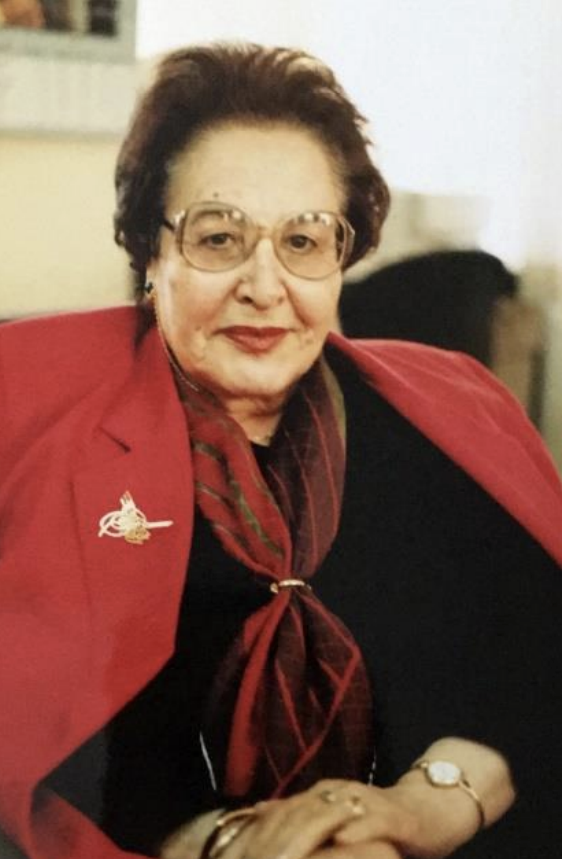Zeynep Korkmaz
July 5th, 1922 – February 6th, 2025
Born in Nevşehir and raised there until elementary school, Zeynep Korkmaz completed her primary and secondary education in Urla and İzmir after her family moved to İzmir. She then moved to Ankara for her higher education and enrolled in the Department of Turkish Language and Literature in the Faculty of Language, History, and Geography (Dil ve Tarih-Coğrafya Fakültesi) at Ankara University in the 1940–1941 academic year. During her studies, she was a student of renowned linguists such as Hasan Eren, Saadet Çağatay, Tahsin Banguoğlu, and Besim Atalay. After graduating from university in 1944, Zeynep Korkmaz (her maiden name was Zeynep Dengi) first became an assistant at the Gazi Eğitim Enstitüsü (Gazi Education Institute) and then at the Faculty of Language, History, and Geography in 1948.
While working as an assistant, Zeynep Korkmaz conducted fieldwork on the dialects of Western Anatolia. During this period, she married Mehmet Korkmaz and had a son in 1950. Her doctoral thesis, based on her fieldwork, was published under the title Southwestern Anatolian Dialects (Phonetic).
In 1954, she was sent to Hamburg, Germany, with the faculty’s budget. There, she took courses from A. von Gabain and O. Pritsak. She returned to Turkey in 1955 and became an associate professor the same year. In 1963, she was appointed professor with her work Nevşehir ve Yöresi Ağızları (Dialects of Nevşehir and its Surroundings).
In the following years, she continued her work on linguistics, Turkish suffixes, and the Turkish language reform. In addition, she conducted studies on Old Ottoman Turkish, Oğuz languages, and Oğuz Turkish, publishing the Old Ottoman Turkish Marzubannâme.
She taught not only at Ankara University but also at Hacettepe and Gazi Universities during various periods. In addition to her academic duties at the university, she also held various administrative positions in academic institutions, the Turkish Language Association (TDK), The Council of Higher Education (YÖK), and Turkish Radio and Television Corporation (TRT). She participated in numerous conferences in Turkey and abroad with papers on Turkish language and culture. Zeynep Korkmaz, who has received many awards, received the PIAC Medal in 2003. Although she ended her teaching activities at universities in the early 1990s, she continued to participate in national and international Turkology conferences until the end of the 2010s.
Zeynep Korkmaz participated in well over a dozen Annual Meetings of the PIAC, her earliest participation on record was at the 12th Meeting in Berlin (1969), the title of her paper being “Die Frage des Verhältnisses der anatolischen Mundarten zu ihrer ethnischen Struktur.” At the 29th Meeting of the PIAC in Tashkent (1986), she was the head of the Turkish delegation.
When Zeynep Korkmaz is mentioned, the first things that come to mind are her contributions to the grammar of Turkish, the grammar book she prepared, and her pioneering work on Anatolian dialectology.
Mehmet Ölmez
October 2025
Selected Works
Güney-Batı Anadolu Ağızları Ses Bilgisi (Fonetik), AÜ DTCF yayınları: 114, Ankara 1956 (2nd edition, Ankara 1994, TDK).
Türk Dilinin Tarihi Akışı İçinde Atatürk ve Dil Devrimi, AÜ DTCF yayınları: 147, Ankara 1963.
Nevşehir ve Yöresi Ağızları, I Cilt: Ses Bilgisi (Phonetique), AÜ DTCF yayınları: 142, Ankara 1963; 2nd edition, Ankara 1977; 3rd edition, Türk Dil Kurumu, Ankara 1994.
Sadrü’d-din Şeyhoğlu, Marzubân-nâme Tercümesi, Giriş- İnceleme-Metin-Sözlük-Tıpkıbasım, AÜ DTCF yayınları: 219, Ankara 1973; 2nd edition, Türk Dil Kurumu, Ankara 2017.
Gramer Terimleri Sözlüğü, Türk Dil Kurumu, Ankara 1992.
Türkiye Türkçesi Grameri: Şekil Bilgisi, Türk Dil Kurumu, Ankara 2003.
Türk Dili Üzerine Araştırmalar, Türk Dil Kurumu, Ankara 1995.
Festschriften
Prof. Dr. Zeynep Korkmaz’a Armağan, Türk Kültürü Araştırmaları, vol. XXXII, 1994, Ankara 1996.
Zeynep Korkmaz Armağanı, Türk Dil Kurumu, Ankara 2004.
Türklük Biliminin Ulu Çınarı Zeynep Korkmaz Armağanı, ed. Leylâ Karahan, Türk Kültürünü Araştırma Ensitüsü, Ankara 2017.
Articles about Zeynep Korkmaz (also used for this obituary)
Hamza Zülfikar, “Hocam Prof. Dr. Zeynep Korkmaz”. Zeynep Korkmaz Armağanı, Ankara 2004: 1–24.
Leyla Karahan, “95 Yılı Geride Bırakmış Bir “Ulu Çınar”ın Hayat Hikâyesi”. Türklük Biliminin Ulu Çınarı Zeynep Korkmaz Armağanı. Ankara: Türk Kültürünü Araştırma Enstitüsü, 2017: 3–12.
Leyla Karahan, Türkçeyle Yaşamak, Zeynep Korkmaz Kitabı. Ankara: Bengü Yayınları, 2018.
Leyla Karahan, “Hocam Prof. Dr. Zeynep Korkmaz’ın Ardından / After the Passing of My Professor, Prof. Dr. Zeynep Korkmaz”, Dil Araştırmaları / Journal of Language Studies, Year: 19, Period: 2025- Spring, Number: 36: 271–278.

